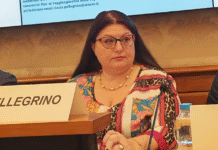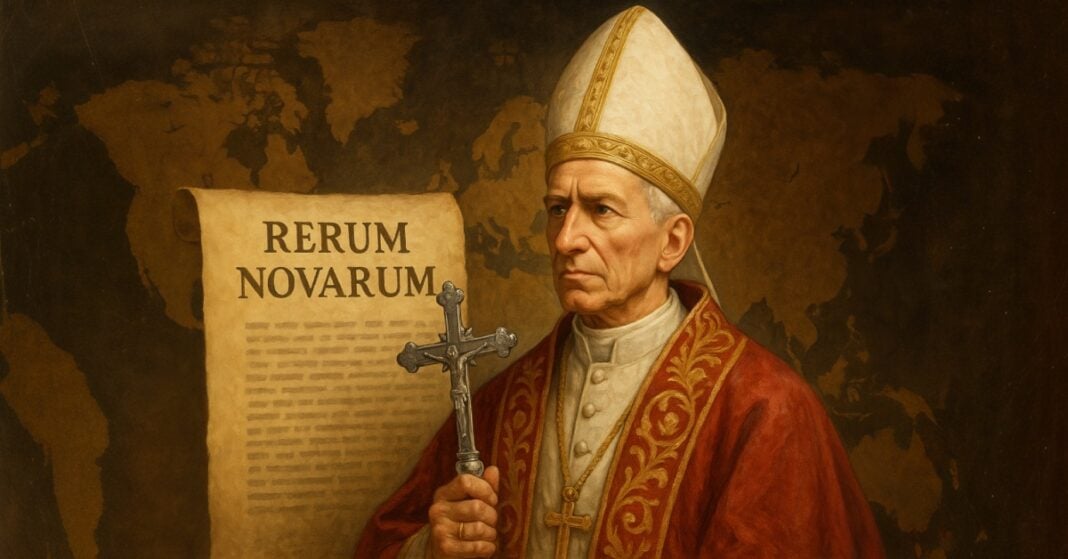Those who have been quick to label Pope Leo XIV as “progressive” should pause and carefully reread Leo XIII’s Rerum Novarum. The choice of that papal name, far from being a simple historical homage, is a programmatic manifesto. It says a lot—a great deal—about how this pontificate intends to interpret its role in a fragmented, confused world that is increasingly distant from its spiritual and cultural foundations. A role that, whether the politically correct salons like it or not, will inevitably be political. Indeed, geopolitical.
Contemporary progressivism—embodied by the globalist elites who gather in Davos, by universities such as Harvard that teach woke ideology as if it were science, by the media that celebrate fluidity as the only truth—has nothing to do with the spirit of Rerum Novarum.
Leo XIII’s encyclical, published in 1891, is a document of extraordinary relevance, not because it anticipates today’s cultural trends, but because it rejects them in the name of a vision of man and society that is eternal, rooted, and non-negotiable. It speaks of social justice, of course, but it does so on the basis of pillars that today’s progressivism has abandoned or, worse, ridiculed: the natural family, work as a vocation and a source of dignity, private property as a right and a responsibility, the community as a living fabric that binds individuals together.
The global left, which once stood as the champion of the working classes, has turned its back on the people. It has renounced the family, reducing it to a contract between interchangeable individuals. It has sold out workers to the ruthless logic of multinationals and Big Tech, which promise flexibility but deliver precariousness. It has ridiculed national identity, branding it as backward, while celebrating an abstract cosmopolitanism accessible only to those who can afford intercontinental flights and master’s degrees in Boston. It has abandoned equality and embraced intersectionality, an ideology that shatters human identity into a myriad of fragmented, often contradictory claims that build nothing but chaos and resentment.
Today, the left is the voice of the elite. It is the megaphone of digital giants who censor dissent in the name of “security.” It is the standard-bearer of a single mindset that considers everything rooted in tradition dangerous: God, country, family, identity. It is the promoter of a Europe without borders, but also without a soul, where bureaucrats in Brussels decide the fate of peoples they have never known.
So who defends the real people today? Who speaks for the unemployed worker, for the single mother struggling to make ends meet, for the young person who dreams of a home and a stable job but comes up against a system that rewards only the privileged? The answer is clear, even if uncomfortable for those who insist on viewing the world through the lens of ideological prejudice: Giorgia Meloni in Italy, Donald Trump and J.D. Vance in America.
These leaders did not emerge from the gilded salons of power. They do not speak the sanitized language of international conferences. They don’t need advisors to know what it means to struggle. Giorgia Meloni, who grew up in Garbatella—Rome’s working-class neighborhood par excellence—and is now Italy’s Prime Minister, has shown that she can hold her head high in the face of European Union diktats, defending the interests of Italians without bowing to pressure from global elites.
Donald Trump, with his direct style and rejection of political correctness, has given a voice back to millions of forgotten Americans—those in the flyover states who do not matter to the media in New York and Los Angeles. J.D. Vance is the embodiment of redemption: raised in a dysfunctional family in rural Ohio, marked by poverty and addiction, he told his story in Hillbilly Elegy, a book that has become the manifesto of an America that does not give up, that still believes in the values of family, work, and community.
They are the ones speaking today with the language of truth. They do not promise unattainable utopias, but responsibility. They do not offer abstract rights, but concrete dignity. They do not celebrate fluidity, but roots. And above all, they are not afraid to challenge the status quo, even at the cost of being demonized by the guardians of political correctness.
In this context, Rerum Novarum emerges as a text that is not only relevant but revolutionary. Because it does not limit itself to denouncing the injustices of unbridled capitalism—as the socialism of the time did—nor does it bow to the lure of unrestrained individualism. Instead, it proposes a third way: a vision of man as a free but not disconnected being; responsible but not abandoned; rooted but not immobile. It is a document that defends private property but links it to the common good. It celebrates work but considers it a right and a duty, not a commodity. It exalts the family and places it at the center of society, not as one option among many.
This vision is the antithesis of contemporary progressivism, which dissolves the individual into a sea of anonymity and empties the community of all meaning. But it is also a challenge for conservatives, who are called to translate these principles into concrete policies: an economy that rewards work and not speculation, a welfare system that supports families and not bureaucracies, a culture that values roots without closing itself off to the world.
If there is one message that Pope Leo XIV seems intent on conveying, it is precisely this: social justice cannot be built against the family, against property, against freedom. And above all, it cannot be built without God. The West, which has relegated spirituality to a dusty corner of its history, finds itself today lost, unable to answer the fundamental questions of existence: Who are we? Where are we going? What is the meaning of our freedom?
Pope Leo XIV faces an immense but necessary mission: to bring God back to the center of a world that has discarded Him like an old shoe. To remind us that without spirituality there is no community, without truth there is no justice, without roots there is no future. This pontificate, with its reference to Rerum Novarum, seems to want to speak not only to Catholics but to all those who feel the weight of an era without a compass. And in this sense, its voice could become a beacon for those who, like Meloni, Trump, Vance and now also Simion are trying to rebuild a solid, responsible, and humane society.
Rerum Novarum leaves us with one certainty: no political, economic, or social project can endure if it tramples on the foundations of civilization. Those foundations—the family, work, community, faith—are under attack today. Not by external enemies, but by an internal ideology that, in the name of progress, seeks to dissolve everything that gives life meaning.
Today, it is not the progressives, with their empty words and fashionable slogans, who are defending these foundations. It is us: those who still believe in truth, responsibility, and identity. Those who are not afraid to call things by their name.
Those who, like Pope Leo XIV, know that the future can only be built by returning to our roots.






























